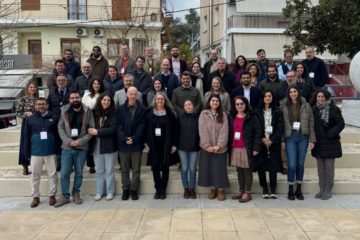Resilience in Tradition: Sitia’s Olive Oil Amidst Climate Change

Throughout history, symbolism has shown olives in moments of prosperity. Just as the olive branch is a representation of peace, olive oil symbolises restoration and healing.
But what do we do when our changing climate poses a threat to this?
As one of the major olive oil producers in the world, alongside its Mediterranean siblings Spain and Italy, Greece is currently contributing to more than 60% of global production. The Peloponnese and Crete regions are particularly important for producing this liquid gold.

Among these idyllic islands, the municipality of Sitia, located in the eastern part of Crete, boasts a rich tradition of olive oil production that has been an integral part of its culture for thousands of years. The knowledge and expertise in olive cultivation have been passed down from generation to generation. This makes Sitia a notable centre for high-quality olive oil, particularly from the Koroneiki variety – a variety of olive that is well-suited to withstand warm temperatures and dry climates.
In recent decades, climate change has posed significant challenges to olive oil production in Sitia. High temperatures and reduced rainfall have adversely affected harvesting and flowering times resulting in higher production costs. Recent harvests have been among the worst on the island of Crete, primarily due to abrupt temperature changes.
https://www.youtube.com/embed/rBFIX0cye_k?feature=oembed Watch the full interview with Giannis Pathiakis here on YouTube
Giannis Pathiakis, an experienced olive oil producer and Secretary of the Agricultural Olive Cooperative of Papagiannades in Sitia, said:
“The region that we’re in has been affected by about 30 to 40% due to climate change.”
Despite these hardships, Sitia has demonstrated remarkable resilience. The region is adopting several adaptive strategies to cope with the changing climate. One significant measure is the installation of drip irrigation systems, which ensure that olive trees receive water more efficiently, using only half the amount required by traditional irrigation systems. This method not only conserves water but also supports the trees during critical growth periods, allowing them to flourish.
Additionally, the modernisation of machinery has played a crucial role in maintaining the quality of olive oil production. By leveraging current technology, producers can achieve greater control over the production process, ensuring that the final product remains of high quality despite environmental challenges. We must embrace innovation to protect tradition.

The cornerstone of exceptional olive oil production in Sitia remains the experience and knowledge of its producers. The dedication and hard work of these individuals are vital in continuing the tradition of olive oil production. Their efforts ensure that, despite the impacts of climate change, this Greek legacy endures and thrives, passing down the secrets of olive cultivation for future generations to nurture. Perhaps olive oil is a symbol for healing and restoration but the people of Sitia are making this a reality by healing and restoring the climate
While climate change has undeniably impacted olive oil production in Sitia, the region’s adaptive strategies and the unwavering commitment of its producers highlight its resilience. It is through this climate resilience and environmental restoration, that we can hope for olive oil to continue to prosper for many years to come.
source : https://regions4climate.eu/resilience-in-tradition-sitias-olive-oil-amidst-climate-change/



0 Comments